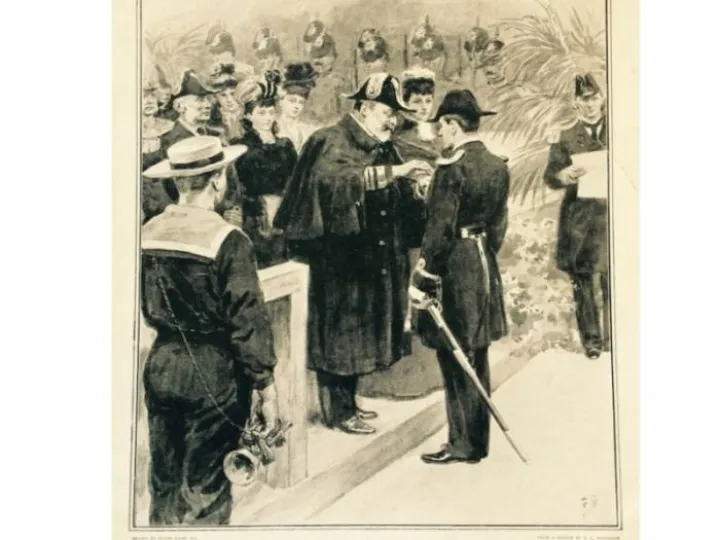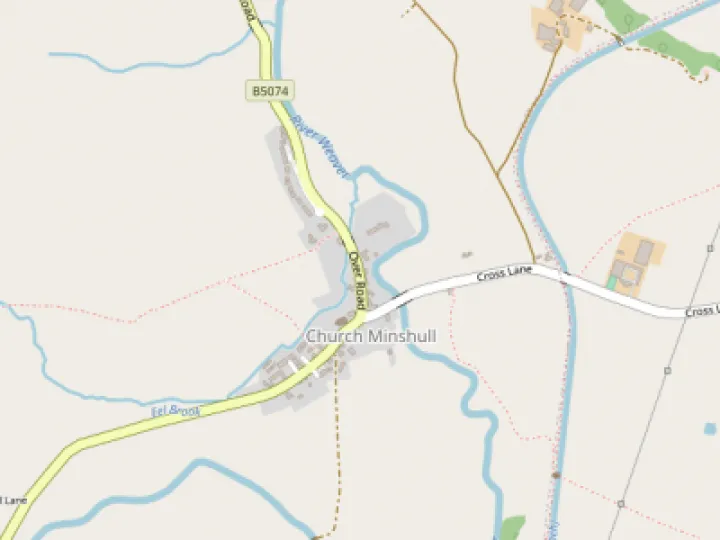







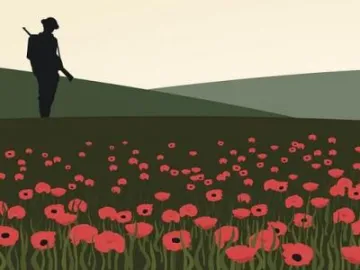
From The London Gazette, 1st January 1901: "The Queen has been graciously pleased to signify Her intention to confer the decoration of the Victoria Cross upon Mr Basil John Douglas Guy, Midshipman, for acts of gallantry during the recent disturbances in China.
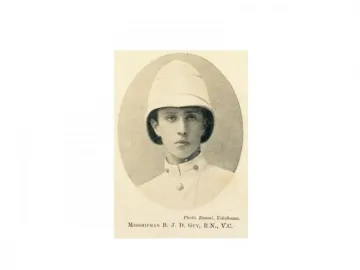
My great-uncle Basil was fortunate to survive the episode recorded in the London Gazette. Born in Bishop Auckland in 1882, he was the eldest of 11 children, 9 of whom survived infancy, leaving 4 boys and 5 girls. His father was at that time the Vicar of Sedbergh, later of Christ Church, Harrogate, and as was I suppose custom at that stage the eldest three boys went into "professions" – respectively the Navy, the Church, and the Army. The youngest son, my grandfather, broke the tradition and aged 18 was sent to Canada on a one-way ticket, to start farming in British Columbia.
At the age of 16 Basil had joined the Royal Navy as a Cadet-Midshipman, and after completing his initial training at Dartmouth was sent out on a P & O steamer to the "China station" where he joined the battleship HMS Barfleur. There in 1900, during the vicious and complex Boxer rebellion, an Allied Naval force of 2000 men was landed to go by train to Peking to help protect British and European nationals. Greatly outnumbered by regular Chinese troops and Boxer irregulars, on 13th July 1900 the Naval Brigade attacked Tientsin City. As the VC citation reads; "a very heavy cross-fire was brought to bear on the Naval Brigade". Basil stopped to assist and then retrieve the badly wounded Able Seaman McCarthy (who sadly later died from his wounds). Unable to bring McCarthy to safety he bound his wounds, then ran to get assistance and returned to retrieve him. "During the whole time a very heavy fire had been brought to bear upon Mr. Guy, and the ground around him was absolutely ploughed up." This is recorded in the watercolour by George Soper. 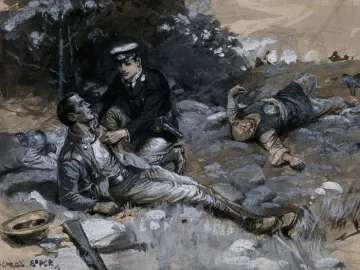
In keeping with the standards of the day Basil's journal makes no mention of the episode. On returning home he was decorated at Devonport on 3rd March 1902 by Queen Victoria's successor, King Edward VII, and later formed part of the guard of Honour at His Majesty's coronation in Westminster Abbey in 1902. His later naval service included the command of HMS Weribee / Wonganella, a Q (decoy) ship in the Mediterranean in which capacity he was awarded the DSO for anti-submarine operations on February 9th 1916. The report describes "after 6 rounds from the Q-ship the enemy ceased firing and the eighth seemed to hit abaft the conning-tower, then she submerged in a cloud of smoke". His younger brother, who was stationed in France with the Artillery, recorded in his diary of 29th February "don't altogether like the news from Basil. He's Captain of a tramp steamer, 6000 tons odd, carrying sand etc from Port Said and so on. Don't know for sure whether he's on some secret job or not ...". A week later he adds, presumably somehow having had further news from his brother, "Basil came across a torpedoed war-ship of sorts and "stood by", only to be shelled by submarine who did him a lot of damage; & of course he had no chance of returning it without any guns on board ... he thereupon rammed it!". Basil's "tramp steamer" was of course armed and there is no corroboration of the ramming suggestion, although like all good stories it grew as the years passed!
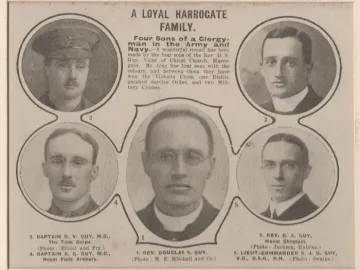
Basil was part of a generation that was utterly affected by war. His 3 brothers all served in the forces and as was the custom at the time their exploits were celebrated by their local Harrogate newspaper, my Great-Grandfather then being Vicar of Christ Church in Harrogate. All these young men were fortunate to survive their military service although Oswald, then a Captain in the West Yorks Regiment, was badly wounded in an Infantry assault in the later stages of the Battle of the Somme during which of the 20 officers in his battalion 8 were killed and 4 were wounded. After recovering he transferred to the Tank Corps. Not much detail is known about Cuthbert's service as Naval Chaplain, but the youngest brother, my grandfather Bernard, joined the Canadian mounted troop Regiment "Lord Strathcona's Horse" in 1914 and sailed to England later that year. They were demounted and served as Infantry in the trenches during 1915. He was later commissioned into the Royal Artillery and kept a diary for all of 1916 and half of 1917. Although largely concerned with the day to day care of his artillery unit there is sufficient detail in the diary to understand the profound horrors that the young men experienced, culminating in him and his colleagues being blown up by several direct hits on a potting shed that they were sheltering in during the Battle of Arras. His diary entries become increasingly brief thereafter before ceasing altogether, and there is no reference to his further service in Belgium, Salonika and Bulgaria. Indeed he never spoke subsequently about his military service, other than to describe a few "humorous episodes" that as grandchildren we were occasionally regaled with.
At the age of 18 years and 2 months Basil was one of the younger recipients of the VC, whose inscription reads "For Valour". Queen Victoria had turned down the originally suggested inscription, "For bravery", on the basis that all Her soldiers were brave. The Victoria Cross was established by Queen Victoria in January 1856, prior to that at that time awards and decorations were given as general campaign medals, or for long service or general meritorious conduct only. Until 1918 Naval VC's had a blue ribbon (or riband as it was originally specified) and Army VC's a crimson one, thereafter a crimson ribbon for all services.
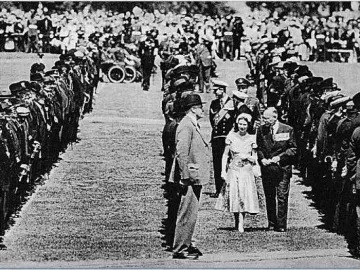
Basil, wearing his original blue ribbon, attended the Centenary Parade of the institution of the VC in 1956 in his wheelchair. He was quizzed by Prince Philip on the blue colour of the ribbon, replying that he had been given the ribbon by the Prince's great-grandfather-in-law and wasn't going to change it now!
Basil died shortly after I was born, but his deeds and those of countless others, honoured, remembered or unknown, remain to remind us of the horrors and follies of war.
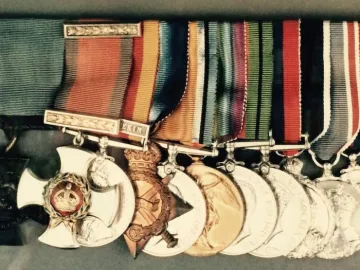
His medals, shown here (click image to enlarge and see full detail) are part of the Lord Ashcroft collection, held at the Imperial War Museum. This article, in briefer form, has previously been published in the November 2015 edition of the Insight local parish magazine. I am indebted to my cousin, Joan Matthews, for sharing family archive detail.
Quick Links
Get In Touch
VillageArena is powered by our active community.
Please send us your news and views using the button below:

